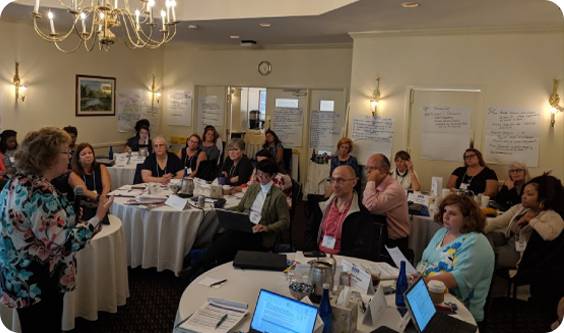
In-service personnel development maintains and expands on the knowledge and skills acquired by EI/ECSE practitioners in preservice courses of study to ensure they have competence in evidence-based intervention practices and new research findings to apply to their jobs.
For more information: CSPD In-Service Training
- Establish a statewide system of in-service personnel development that is aligned to national professional organizations and state personnel standards across disciplines.
- Create a statewide system for in-service personnel development that includes a variety of technical assistance opportunities to meet the needs of early childhood intervention (ECI) personnel in a variety of disciplines.
- Recommend that in-service training and professional development be coordinated across early childhood systems and delivered collaboratively, as appropriate.
- Ensure that families and/or parent organizations participate in the design and delivery of in-service professional development.
Link to State CSPD Page
CSPD State Work on In-Service
Hawaii
Resources
The Initial Practice-Based Standards for Early Interventionists/Early Childhood Special Educators (EI/ECSE) standards represent the first Standards to focus specifically on the preparation of early interventionists and early childhood special educators who work with young children ages birth through eight who have or are at-risk for developmental delays and disabilities and their families, across home, classroom and community settings.
Cross-Disciplinary Competencies
Representatives from each of the seven professional organizations reviewed the competency areas and sub-areas and presented these core competency areas for approval to each of their respective organizations. American Occupational Therapy Association (AOTA); the American Physical Therapy Association (APTA); the American Speech-Language-Hearing Association (ASHA); the Council of Exceptional Children (CEC) and the Division of Early Childhood (DEC), the National Association for the Education of Young Children (NAEYC); and ZERO TO THREE.
View Report .pdf- PD Practices and use of ECI Practices 2019
In-Service Brief
Crosswalks of the EI/ECSE Standards
Crosswalk of the Initial Practice-Based Professional Preparation Standards EI/ECSE with DEC RPs
Crosswalk of the Initial Practice-Based Professional Preparation Standards Early Interventionists/Early Childhood Special Educators (2020) with the DEC Recommended Practices (2014)
Crosswalk EI/ECSE and ECE Standards
Crosswalk of the CEC Initial Practice-Based Professional Preparation Standards Early Interventionists/Early Childhood Special Educators (2020) with the Early Childhood Educators Standards (NAEYC)
The ECPC collaborated with the Early Childhood Technical Assistant Center (ECTA) to create an Early Childhood Systems Framework for Part C and section B(619) Coordinators to evaluate their current systems, identify potential areas for improvement, and develop more effective and efficient systems that support implementation of evidence-based practices in each of six main areas. The ECPC’s work resides in the Personnel/Workforce (PN) component of this framework, which addresses the necessity of understanding workforce capacity in order to provide timely and consistent services by prepared personnel in early childhood. ECPC-CSPD Self-Assessment
Quality Indicators
Quality Indicator 7: A statewide system for in-service personnel development and technical assistance is in place for personnel across disciplines.
-
- A statewide system for in-service personnel development is aligned to national professional organization personnel standards across disciplines.
- A statewide system for in-service personnel development is aligned to state personnel standards across disciplines.
- The statewide system for in-service personnel development provides a variety of technical assistance opportunities to meet the needs of personnel.
- The in-service personnel development component of the CSPD plan is guided by updated needs assessments of the capability of the workforce in relation to the desired knowledge and skill competencies.
- In-service personnel development is coordinated across early childhood systems and delivered collaboratively, as appropriate.
- In-service personnel development employs evidenced based professional development practices that incorporate a variety of adult learning strategies including job embedded applications such as coaching, reflective supervision and supportive mentoring.
- In-service learning opportunities are individualized to the needs of the participants and the objectives of the personnel development.
- Families and/or parent organization participate in the design and delivery of in-service personnel development.
Quality Indicator 8: A statewide system for in-service personnel development and technical assistance is aligned and coordinated with higher education program and curricula across disciplines.
-
- The content for in-service personnel development is based on evidence-based practices.
- Faculty from IHEs and in-service staff meet on a quarterly basis to plan for, coordinate, and collaborate on in-service content.
- Content for in-service personnel development extends the depth of core knowledge and skills acquired in pre-service programs and addresses updated knowledge on evidence-based practices and changes in state policies and initiatives.